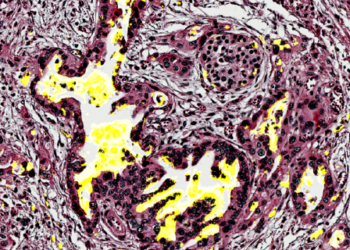Potential New Treatment Option for Diabetic Retinopathy
Potential New Treatment Option for Diabetic Retinopathy
OU researcher developing potential new treatment for diabetic retinopathy that could address the problem much earlier.
OKLAHOMA CITY, OKLA. – Patients with diabetes face a host of potential health problems as they work to manage the chronic disease. Still, one concern that seems to weigh heavily is the risk of losing their sight through a condition known as diabetic retinopathy.
Researchers at the University of Oklahoma Health Sciences and Memorial Sloan Kettering (MSK) Cancer Center are studying a new, revolutionary treatment for diabetic retinopathy that could change the prognosis for these patients. Julia Busik, Ph.D., professor and chair of the department of biochemistry and physiology in collaboration with Richard Kolesnick, MD of MSK Cancer Center, recently published a paper in the journal Cell Metabolism that details how anti-ceramide immunotherapy can address the root cause of the disease and stop progression toward blindness at an earlier stage than previous treatments.
“With the rise in diabetes, there’s a rise in complications. One-third of adults over age 40 with diabetes have retinopathy,” said Busik. “If left untreated, diabetic retinopathy can lead to blindness. Losing vision is one of the most feared complications for patients with diabetes.”
This blindness is caused by hemorrhaging lipid, or fatty compound, build-ups. These start as dark spots in the field of view but can, as they multiply, become vision-threatening and eventually cause blindness. There are currently two treatments for diabetic retinopathy, but both have serious health implications and are fairly invasive. One involves lasers that burn the vessels to stop the hemorrhaging; another involves injections directly into the eye that can stop the progression of the disease. According to Busik, these treatments are only sometimes effective.
The researchers are working on an exciting new treatment that could address the root cause of diabetic retinopathy. Continuing research that she began at Michigan State University, Busik has taken a closer look at lipids, specifically lipid pathways in the retina of the eye, and how they are affected by diabetes. She and her team found that a certain, very damaging type of lipid, or ceramide, was present in the eyes of patients with diabetic retinopathy. In turn, they discovered that these ceramides, after stimulation by another type of cell – cytokines – stick together into large domains that cause damaging inflammatory signals to cells in the eye. This causes cell death and the progression of diabetic retinopathy.
In collaboration with the Kolesnick laboratory at MSK Cancer Center, Busik’s team was then able to create an antibody against these lipids to prevent the ceramide buildup from happening and signaling the damage to healthy cells in the retina. The studies show great promise in animal and cell culture models.
Perhaps the most important advance from the current treatment is that it addresses the root cause of the disease, as opposed to late symptoms and stopping progression at the vision-threatening stage, explains Busik. It can also be administered systemically, so it does not have to be injected into the eye. Due to their invasive nature and safety concerns, currently available treatments are only used at very late stages of the disease when the vision is threatened.
“If we have this systemic safe treatment,” said Busik. “It could be given to a patient at a much earlier stage when they are just starting to progress, to make sure that they never get to that late stage.”
About the Project
This research was funded by the NIH grants: R01EY016077 and R01EY030766. This research was also funded, in part, through the NIH/NCI Cancer Center Support Core Grant P30 CA008748. Additional authors of the study include Tim F. Dorweiler, Arjun Singh, Aditya Ganju, Todd A. Lydic, Louis C. Glazer, Richard N Kolesnick. RNK is a founder of Ceramedix Holding LLC. JVB is a consultant for Ceramedix, Inc., subsidiary of Ceramedix Holding LLC. The publication is available at https://doi.org/10.1016/j.cmet.2024.04.013.
About the University of Oklahoma
Founded in 1890, the University of Oklahoma is a public research university located in Norman, Oklahoma. As the state’s flagship university, OU serves the educational, cultural, economic and health care needs of the state, region and nation. OU was named the state’s highest-ranking university in U.S. News & World Report’s most recent Best Colleges list. For more information about the university, visit www.ou.edu.
Journal
Cell Metabolism
Method of Research
Experimental study
Subject of Research
Animals
Article Title
Diabetic retinopathy is a ceramidopathy reversible by anti-ceramide immunotherapy
Article Publication Date
7-May-2024
Discover more from Science
Subscribe to get the latest posts sent to your email.



